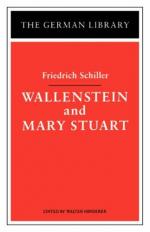|
This section contains 9,451 words (approx. 32 pages at 300 words per page) |

|
SOURCE: “Ideal Freedom,” in Schiller, Basil Blackwell, 1949, pp. 165-86.
In the following essay, Witte argues that Maria Stuart, Die Jungfrau von Orleans, and Die Braut von Messina embody and illustrate Schiller's idea of the tragically sublime: the triumph of the moral self over the human being's material existence, emotional impulses, and physical nature, or the victory of spiritual freedom over the bondage of the flesh.
The years that remained to Schiller after the completion of Wallenstein were devoted almost entirely to the drama. After the self-imposed discipline of historical study and philosophical reflection, after the tardy growth of Wallenstein, the tempo of his dramatic production suddenly increased in a spectacular way: from now on, plays poured from his pen at the remarkable rate of one a year. This spate of creative work came at a time when Schiller was once again in close contact with the practical affairs...
|
This section contains 9,451 words (approx. 32 pages at 300 words per page) |

|


